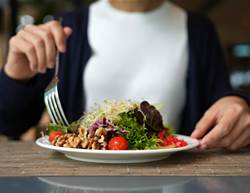You can probably rattle off several heart disease risk factors off the top of your head − high blood pressure or cholesterol, type 2 diabetes and being overweight. But, along with getting plenty of exercise, sleeping soundly and knowing how to de-stress, eating well plays a major role in keeping all these factors under control.
“When planning your meals, you want to pick your foods from each of these categories: fruits and vegies, lean proteins, wholegrains and healthy fats,” says dietitian Joy Bauer.
You should also minimise sodium (salt), fatty meats and full-fat dairy, as well as refined starches, such as white flour, white rice, sugar and sweet treats.
Smart food choices
Here, Bauer shares her top foods from these categories and also her best hacks for getting extra heart-healthy power.
Fruits and vegies
Bananas are high in potassium, which can help lower blood pressure by counteracting the effects of sodium. “They can also lend natural sweetness to muffins, breads and smoothies, so there’s no need to add sugar,” says Bauer.
Limiting added sugar promotes a healthy weight and healthy blood glucose levels, both key to preventing type 2 diabetes. Bauer also favours apples, which contain pectin, a type of fibre that blocks cholesterol absorption to keep cholesterol levels healthy. Another perk: they boast polyphenols, which are antioxidants that may help tame inflammation.
Lean proteins
Bauer recommends lentils, which have fibre along with protein, both of which keep you full and satisfied. “This combo also helps temper the blood sugar spike that occurs after a meal, and that can further help manage appetite and weight,” she says. Lentils are also high in magnesium and potassium, minerals that work together to lower blood sugar and keep your heart and blood vessels healthy.
Salmon is another good choice. It’s rich in omega-3 fatty acids, a polyunsaturated fat that’s been shown to lower inflammation and reduce harmful fats in the blood, plus it’s satiating and stabilises blood sugar.
Wholegrains
Oats boast a stellar line-up of heart-friendly nutrients: fibre, protein and vitamins and minerals that help keep inflammation under control. Over time, inflammation can harm the heart by irritating blood vessels or promoting plaque build-up in the arteries.
Healthy fats
Avocados are a tasty source of monounsaturated fats, which help lower blood pressure and improve cholesterol levels, and they’re also rich in potassium and fibre. Bauer adds that extra virgin olive oil is a must for its healthy monounsaturated fats, in this case in the form of oleic acid.
Try these heart-healthy food hacks
Supercharge your heart health with a few easy tricks. “Making these small changes − even just some of them − can help you maintain a healthy weight and keep other heart disease risk factors at bay,” says Bauer.
Drink two cups of water before meals. “Water is crucial for a healthy metabolism, and it helps take the edge off hunger so you won’t eat more than you should,” she says.
Double up on vegies. Vegies are packed with fibre and water, so you’ll feel fuller longer and have less of an urge to snack throughout the day. Swap in zucchini ‘noodles’ for regular pasta. “It works for Italian (think zucchini linguine with meatballs marinara), Asian and more,” she says.
Spray, don’t pour. Use an oil spray instead of pouring oil from the bottle − you’ll use far less.
Add mashed cauliflower or parsnips to mashed potatoes. You can try a 1:1 ratio for a creamy lower-carb treat, or go for 100% mashed cauli to lower carbs even more dramatically.
Replace bread or tortillas with lettuce. “Fill lettuce leaves with a flavourful mixture of vegies and lean protein, and you won’t miss the real thing!” she says.
Swap sour cream with non-fat (or low-fat) Greek yoghurt in dips and dressings. “Greek yoghurt is flavour-neutral, loaded with protein and also low in kilojoules,” explains Joy.
Build a better plate: Fill ½ of your plate with vegies and/or fruit, ¼ with wholegrains, and ¼ with lean protein.










